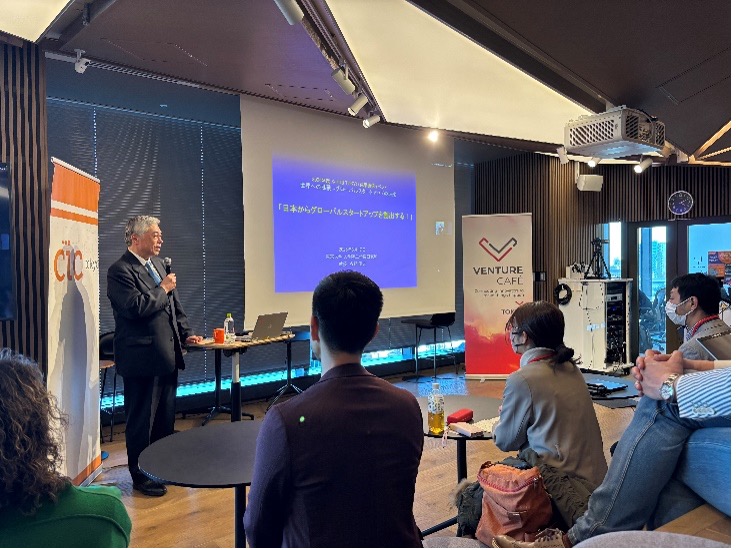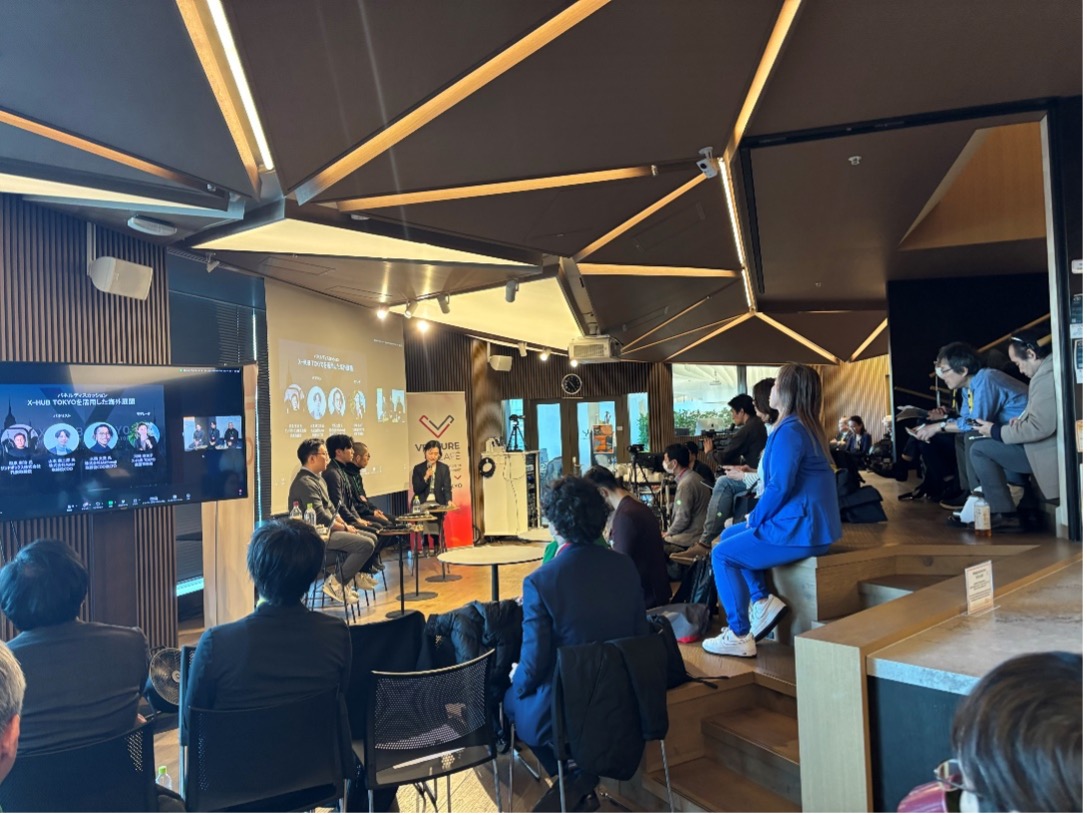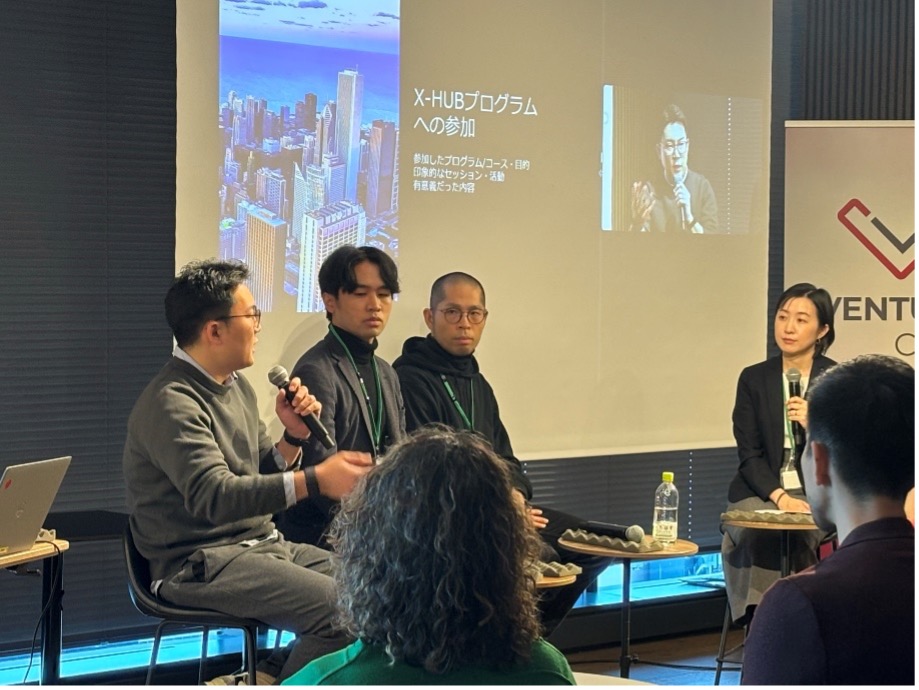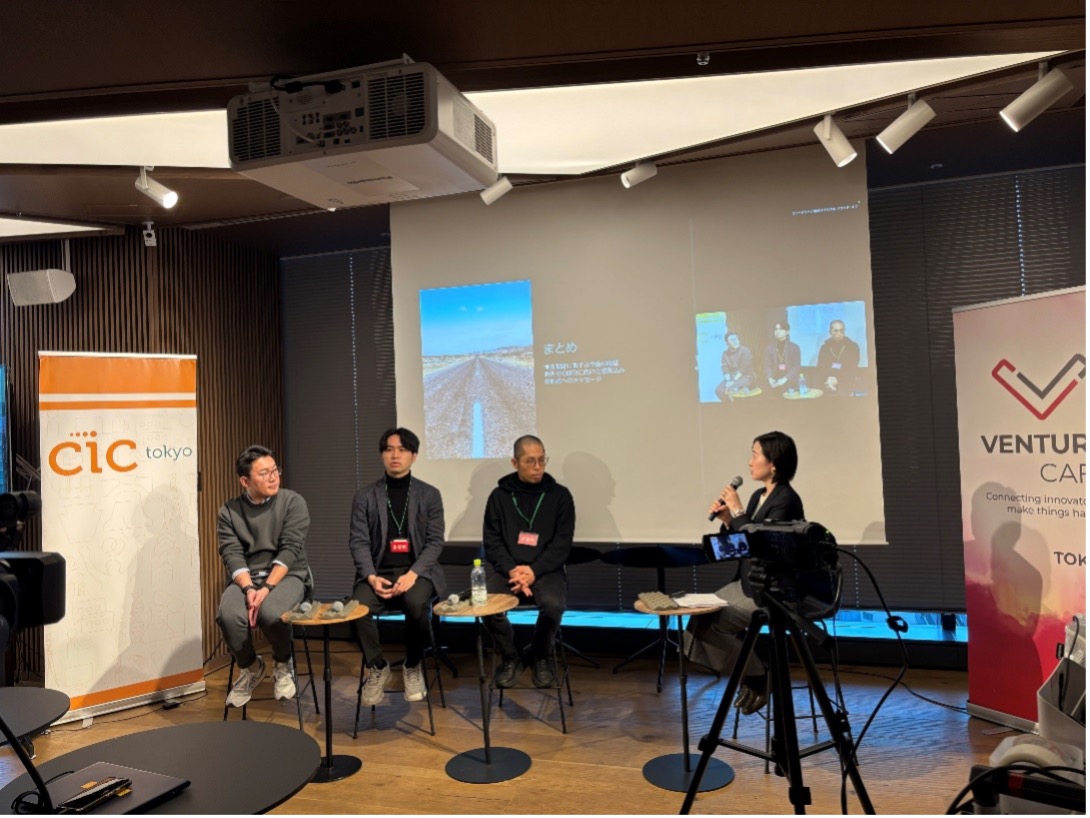On March 17, the X-HUB TOKYO program, which supports the overseas expansion of startups in Tokyo, held its 2024 Wrap-up Event titled “Challenging the World – The Future of Global Startups.”
In the first half of the event, Professor Shigeo Kagami of the Graduate School of Engineering, the University of Tokyo delivered a keynote speech titled “Creating Global Startups from Japan!” Drawing from his extensive experience in entrepreneurial education and venture support, he discussed the necessity for Japanese startups to aim globally and shared key points to consider when planning overseas expansion.
The second half featured a panel discussion with three distinguished speakers: Koji Izumi, CEO of Sandbox Inc.; Kenjiro Yamamoto, COO of Aster Co., Ltd; and Fumitaka Osumi, COO and CFO of Mathmaji Co., Ltd. These startups, which participated in X-HUB’s ‘OUTBOUND PROGRAM’ and ‘SCRUM PROGRAM,’ shared their experiences and prospects for global expansion.
Keynote Speech: “Creating Global Startups from Japan!”
 Professor, Graduate School of Engineering, Deputy Director General Division of University Corporate Relations, The University of Tokyo
Professor, Graduate School of Engineering, Deputy Director General Division of University Corporate Relations, The University of Tokyo
Former President, The Japan Academic Society for Ventures and Entrepreneurs
Dr. Kagami Shigeo
- To begin, we spoke with Professor Shigeo Kagami from the Graduate School of Engineering at the University of Tokyo, who also served as the former President of the Japan Academic Society for Ventures and Entrepreneurs. He shared insights on growth strategies for Japanese startups and the key points for achieving success.
- Throughout my career, I have engaged with numerous startups through research activities at the university and open innovation initiatives. According to objective information, as of February 2024, Japan ranks 12th globally in the number of unicorn companies. However, I believe there are significant opportunities for Japan’s potential technology and ideas to be more highly valued on the international stage. To realize this potential, it is crucial to enhance competitiveness in the global market and identify winning strategies.
For instance, the University of Tokyo, where I belong, generates 600 inventions annually, and there is substantial potential to convert these into businesses. Developing business plans based on research results and scaling up after conducting PoC (Proof of Concept) requires market feedback from customers. During this process, it is crucial to protect intellectual property and establish a foundation for global expansion, which I believe is the key to success.
- What Key Considerations should Startups consider when aiming to expand overseas?
- The most important thing is to have a global perspective from beginning. Many startups attempt to expand overseas after achieving success in the domestic Japanese market, but this often leads to failure. Particularly in Japan, once a company goes public, shareholders demand continuous revenue and profit growth, making it difficult to make significant investments. It is essential to create a business plan with the global market in mind from the start and to consider whether the technology or ideas can be internationally viable.
Additionally, having knowledge of the target market is indispensable for expanding into the global market. At the same time, understanding the market environment and customer needs overseas and developing strategies based on that understanding requires appropriate global talent. Specifically, to transform technology and ideas into global competitiveness, it is crucial to collaborate with partners who have experience in overseas markets and to have the capability to create a business plan.
Japan is often referred to as a ‘developed country facing challenges,’ tackling issues such as a declining birthrate and aging population ahead of other countries. As a nation that has confronted these challenges first, Japan’s experience can contribute to solving global social issues. Remaining confined to the domestic market, no matter how exceptional the elements you possess, will prevent you from making a mark on the global stage. Let’s take on the world and rise to the challenge!
Panel Discussion: Utilizing X-HUB TOKYO for Overseas Expansion

- Next, in the second half of the event, we will hold a panel discussion. The facilitator will be Maiko Kawasaki from the X-HUB TOKYO administrative office. We welcome the following panelists: Koji Izumi, CEO of Sandbox Inc.; Kenjiro Yamamoto, COO of Aster Co., Ltd; and Fumitaka Osumi, COO and CFO of Mathmaji Co., Ltd. First, we would like to hear your self-introductions and your involvement with X-HUB.
- Koji Izumi (Izumi): Hello, my name is Koji Izumi from Sandbox. Our company develops fitness equipment with IoT sensors, specifically a sandbag. In 2023, we participated in the Europe course of the X-HUB OUTBOUND PROGRAM and exhibited at the ‘Web Summit’ in Lisbon, Portugal. We had about 200 users try our product in a single day, which allowed us to establish connections with investors and fitness-related companies from the U.S., U.K., and EU, leading to ongoing business negotiations. We planned to continue participating in the New York Course and Europe Course of the OUTBOUND PROGRAM in 2024 to find local partners.
Kenjiro Yamamoto (Yamamoto): Hello, I am Kenjiro Yamamoto from Aster. Our mission is ‘Zero Earthquake Victims,’ and we develop seismic-resistant paint as a material for earthquake resistance. In 2023, we participated in the SCRUM PROGRAM, which was extremely helpful for our overseas expansion as it allowed us to interact with overseas VCs. In 2024, we participated in the OUTBOUND PROGRAM’s Indonesia course, which supported us in networking with local ecosystem stakeholders, business matching, and mentoring.
Fumitaka Osumi (Osumi): Mathmaji develops a global mathematics learning app based on Japanese math education, primarily in the U.S. We chose the U.S. as our expansion market due to its market size and the scope of the problems and other considerations, and we are currently focused on Texas. In 2024, we were selected for the OUTBOUND PROGRAM’s Silicon Valley Course, which provided opportunities for partnerships with business partners. After returning to Japan, we also participated in the SCRUM PROGRAM, where we learned about the principles and theories of overseas expansion.

- Could you tell us about the reasons for aiming for overseas expansion, the current status of your expansion, and your impressions of participating in X-HUB programs?
- Izumi: I wanted people overseas to use our products, so from the start, we aimed to expand our products internationally. We initially targeted North America due to the living space and market size, and we are now considering expansion into Europe and various Asian countries.
Through the X-HUB program, exhibiting at trade shows was invaluable for understanding local needs, hearing real feedback, and experiencing the differences in reactions compared to Japan. However, during our first overseas exhibition, we were not fully prepared to negotiate collaboration specifics. For our second participation, we prepared thoroughly by creating a list of potential customers before traveling and were able to discuss collaboration details locally. The support from X-HUB in preparing for the exhibition and arranging appointments was a great help.
Yamamoto: Growing up in a region prone to earthquakes, I’ve always wanted to solve earthquake-related issues. When I looked overseas, I noticed many places where buildings are made of stone or brick, which are highly vulnerable to earthquakes. This led us to prioritize solving this issue through our business. We are currently focusing on expanding in ASEAN regions like Indonesia and the Philippines.
The X-HUB program provided valuable opportunities to discuss with investors and VCs whether the markets we were targeting were optimal for our global expansion. In Indonesia, making connections with the largest local developer was a significant achievement.
Participating in the program over two years was very meaningful. It was beneficial to learn the theories of overseas expansion and then put them into practice locally. I was glad to participate in both the SCRUM PROGRAM and the OUTBOUND PROGRAM.
Osumi: In our case, our CEO was already conducting business in the U.S., and when we introduced our educational content to local schools, we saw a significant improvement in learning outcomes, which led to our current business.
Since the market characteristics differ by state in the U.S., we believed it was important to conduct market research. Participating in the OUTBOUND PROGRAM allowed us to gather local feedback. Before traveling, we made a list of companies, investors, and VCs we wanted to connect with, and the X-HUB team supported us in preparing for this. Additionally, in the SCRUM PROGRAM we joined after returning to Japan, each startup was assigned a mentor, providing diverse perspectives and feedback that were extremely helpful.

- Finally, could you please share a message of encouragement for startups aiming for international expansion?
- Osumi: The X-HUB program is well-structured with a packed schedule during overseas visits, ensuring that startups can effectively execute what is necessary. Based on the insights and learnings we gained from participating in the program, we plan to maintain ongoing contact with the people we met locally through newsletters and other means. I would like to emphasize that it doesn’t end with just visiting the local market; the visit should serve as a starting point for further developments.
Yamamoto: Japan tends to be on the ‘rule-following’ side rather than the ‘rule-making’ side. However, we aim to establish rules in our business domain. The X-HUB program provided numerous opportunities for concrete discussions, which were extremely helpful in considering business development and strategy. I highly recommend it to startups aiming for international expansion.
Izumi: We are advancing our business with a minimal team, and although our company is small with only a few million yen in capital, being selected for the program allowed us to spend very meaningful time. I encourage startups aiming for international expansion not to worry too much about the scale of their business and to actively apply for the program.
- In this event, we had the opportunity to hear from startups and experienced entrepreneurs actively pursuing international expansion. They shared concrete methods for utilizing overseas visits and exhibitions, as well as the subsequent paths for international expansion. X-HUB TOKYO will continue to provide information about the characteristics of overseas ecosystems and markets, as well as key points for international expansion through various events.

